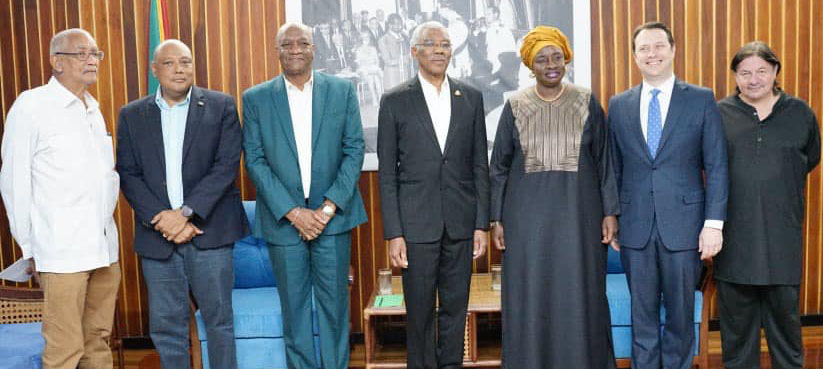After weeks of waiting for positive word, the US-based Carter Center yesterday expressed disappointment at not being able to return and observe the recount of votes from Guyana’s March 2nd general elections and rapped the APNU+AFC government over the shutout.
In a statement, the Center said it “is disappointed that the government of Guyana chose not to demonstrate a genuine commitment to transparency by ensuring that all duly accredited organizations, including The Carter Center, be allowed to conduct their work.”
Coming on the heels of weeks of diplomatic lobbying by the US government with Georgetown and calls by Canada and others, the Center’s acceptance that it is not returning leaves the recount process in midstream without a sufficient number of international observers. The Center said it had been seeking approval for the return of two accredited observers.
Caretaker President David Granger’s assertion on Sunday that the denial of permission is due to COVID-19 restrictions has been seen as not credible as the government has granted permission for hundreds of oil workers to enter Guyana and is also now preparing to receive flights of Guyanese stranded overseas.
Significantly, in its statement yesterday, the Center maintained its position that voting on March 2nd was smooth and orderly and trouble only emerged at the tabulation of results for District Four.
“While the Center and other international observers indicated in public statements that preparations for elections were conducted satisfactorily and that voting procedures on election day met international standards, it found that the tabulation process lacked transparency in Region 4 and therefore the tabulation process was not credible and did not meet international standards. The Center found that tabulation in March was conducted well in Guyana’s nine other regions”, the Center said.
This contention by the Center would be seen as a blow to the APNU+AFC argument in the ongoing recount that there were numerous deficiencies at polling stations on March 2nd.
The Center pointed out that the Guyana Elections Commission has consistently confirmed that the accreditation of The Carter Center and other international observation groups remains valid, that the electoral process is not complete, and that international observers are welcome.
The Center in its statement acknowledged the important role being played during the recount by the three-person CARICOM team, as well as that of Guyanese national observers, political party scrutineers, the Organization of American States, and the Commonwealth’s technical advisor.
“While noting the positive contribution that each of these actors is making to foster transparency, the Center is disappointed that the government of Guyana chose not to demonstrate a genuine commitment to transparency by ensuring that all duly accredited organizations, including The Carter Center, be allowed to conduct their work”, the Center added.
The Center said it fully respects Guyana’s national sovereignty and its efforts to strictly apply its COVID-19 emergency measures as a matter of utmost urgency. The Center said it had indicated in its formal requests that it would abide by all of the government’s COVID-19 protocols, including those applied to the CARICOM team i.e. that any observers who return must test negative for COVID-19 on a WHO-certified polymerase chain reaction test in advance of travel to Guyana.
The Carter Center said it was honoured to be invited by the government to provide a neutral and independent assessment of Guyana’s electoral process. To date, it noted that it has issued public statements with preliminary findings providing assessments of the electoral process through election day and the first few days postelection.
It argued that the Center’s overall assessment of Guyana’s electoral process cannot be complete until the votes on March 2 have been counted, tabulated, and announced – and any subsequent dispute-resolution process completed.
“An accurate and honest counting of votes is essential to ensuring that the election reflects the will of the people. Even if preelection and election day processes go well, a flawed vote count or vote tabulation can fatally undermine the integrity and credibility of the electoral process and decrease public confidence and public acceptance of the results. The electoral dispute-resolution process and the extent to which citizens, voters, candidates, and other stakeholders have the right to an effective remedy is also a critical element of any electoral process”, the Center contended.
The Center said it is hopeful that the recount and tabulation process currently underway will be completed with full transparency so that it yields a result that can be recognized as credible and reflective of the will of the people as expressed on March 2.
The Carter Center says it remains committed to its mandate to observe Guyana’s electoral process and extends its hope that Guyanese can work together in the days ahead to build a future that benefits all citizens.
“Regardless of the outcome of the election, the Center reiterates (the) view that Guyana’s winner-takes-all system needs to be reformed and encourages all parties to commit to national reconciliation and to completing key constitutional reforms in the near future”, the Center added.
The Center was instrumental in ensuring electoral reforms in 1990 that eventually paved the way for free and fair elections after decades of rigging by PNC governments. It mounted observer missions to a number of elections after that including in 2015 when it adjudged that process to have been reflective of the will of the people.
The Carter Center announced on March 20th that it was withdrawing from Guyana after weighing a number of factors, including the absence of an ongoing electoral process, increasing restrictions on international travel because of COVID-19, and the decline in the security environment here.
The Center said then that it remained committed to its mandate to observe the entirety of the electoral process and remained on standby to return to Guyana.
The Center team was co-headed by Jason Carter, grandson of former US President Jimmy Carter and former Senegalese Prime Minister Dr. Aminata Touré.






